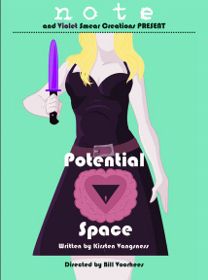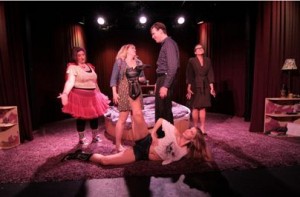IN LOVE OR IN LOVE WITH BEING IN LOVE
Playwright Kristen Vangsness’ intriguing, but ultimately frustrating comedy features as its center a gal who makes the mistake of confusing love with, well, let’s charitably call it the desire “to be” in love. It is what folks brought up in civilized company would call “passion”—but it’s really just good ole fashioned “lust.”
For, you see, the vagina is virtually a character here. It ferociously drives the main character’s every thought and passion, encourages her to make dreadful decisions, and even causes her to ignore the fates of those who truly care for her. In other words, in Vangsness’ play, the protagonist is motivated by a need for a romantic partner who is less of a nice guy, and more like one who has the ability to make her woman-parts jangle like a sleighbell at Christmas season.
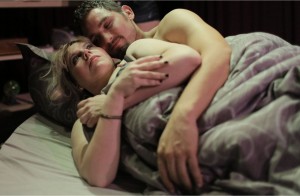 Free spirited Dulcie (Vangsness) is a vivacious and ebullient woman whose track record with the opposite sex is so appalling you’d advise her to enter a convent and give it all up. At the play’s start, she has a boyfriend (Tristan James Butler) who is almost unbelievably wonderful—he’s kind, adoring, and possesses (we are told) a beautiful penis that should be the answer to every woman’s need. However, in spite of all these positive attributes, Dulcie simply can’t grok the fellow—something about his not being able to make her orgasm properly, I am sorry to say. Before long, Dulcie gets her wish: After dumping Mister Pleasant, she hooks up with a hunky stud (Eric Neil Gutierrez) with a dong of death which rings all her bells with his enormous clapper.
Free spirited Dulcie (Vangsness) is a vivacious and ebullient woman whose track record with the opposite sex is so appalling you’d advise her to enter a convent and give it all up. At the play’s start, she has a boyfriend (Tristan James Butler) who is almost unbelievably wonderful—he’s kind, adoring, and possesses (we are told) a beautiful penis that should be the answer to every woman’s need. However, in spite of all these positive attributes, Dulcie simply can’t grok the fellow—something about his not being able to make her orgasm properly, I am sorry to say. Before long, Dulcie gets her wish: After dumping Mister Pleasant, she hooks up with a hunky stud (Eric Neil Gutierrez) with a dong of death which rings all her bells with his enormous clapper.
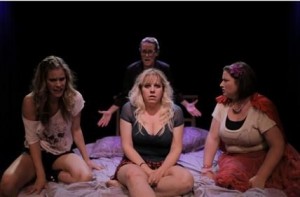 The trouble is, it turns out he’s also a bit of a brute with a mean right hook—and Dulcie is surprised to discover that she actually enjoys being beaten just as much as she enjoys getting laid. Dulcie’s self-admittedly self-absorbed romantic troubles are melodramatically contrasted with the travails of her best friend (David Wilcox), a sardonic gay man who happens to be dying of AIDS-related issues. And her internal conflicts are depicted visually by the onstage interactions of a trio of women, one of whom represents her lustful libido (Jennifer Flack), one of whom is her childlike soul (Wendi West), and one of whom is her prissy cerebral thinking mind (Lauren Letherer). Throughout the play, it is the libido to whom Dulcie pays the most attention.
The trouble is, it turns out he’s also a bit of a brute with a mean right hook—and Dulcie is surprised to discover that she actually enjoys being beaten just as much as she enjoys getting laid. Dulcie’s self-admittedly self-absorbed romantic troubles are melodramatically contrasted with the travails of her best friend (David Wilcox), a sardonic gay man who happens to be dying of AIDS-related issues. And her internal conflicts are depicted visually by the onstage interactions of a trio of women, one of whom represents her lustful libido (Jennifer Flack), one of whom is her childlike soul (Wendi West), and one of whom is her prissy cerebral thinking mind (Lauren Letherer). Throughout the play, it is the libido to whom Dulcie pays the most attention.
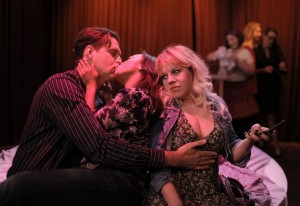 Vangsness is to be commended for crafting a play boasting a multidimensional heroine whose remarkable complexities make it hard to entirely judge her. Yes, if you met the character in real life, you’d give her a good shake and tell her to be sensible. Yes, you want to yell at her for staying with the abusive thug and loving it, instead of caring for her kindly, dying gay BFF as he dies without her. You want to sit her down and remind her that the sexual attraction part of being in love isn’t the romantic life in toto and a mature soul would have the wits to realize this.
Vangsness is to be commended for crafting a play boasting a multidimensional heroine whose remarkable complexities make it hard to entirely judge her. Yes, if you met the character in real life, you’d give her a good shake and tell her to be sensible. Yes, you want to yell at her for staying with the abusive thug and loving it, instead of caring for her kindly, dying gay BFF as he dies without her. You want to sit her down and remind her that the sexual attraction part of being in love isn’t the romantic life in toto and a mature soul would have the wits to realize this.
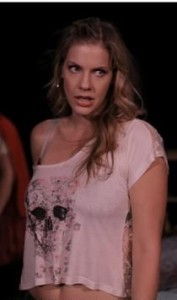 However, there are people in the real world who are like this too—and there is no guarantee in the theater that we’re going to like every character we’re introduced to. Really, if a play’s protagonist actually engenders a desire on the part of the viewer to want to pinch her for being a muddle-brained doofus—well, that’s a strong reaction that arises out of the craftsmanship of the play, at least in part.
However, there are people in the real world who are like this too—and there is no guarantee in the theater that we’re going to like every character we’re introduced to. Really, if a play’s protagonist actually engenders a desire on the part of the viewer to want to pinch her for being a muddle-brained doofus—well, that’s a strong reaction that arises out of the craftsmanship of the play, at least in part.
More problematic, though, are issues relating to the writing of the play itself. In director Bill Voorhees’s unexpectedly artless staging, Vangsness’ text sometimes does not seem up to the challenges of relating the emotional ambiguities she’s set for it. Stylistically, the play changes tone so many times that it falls into clumsiness like a creative writing class exercise: One moment, the show’s a surreal tale of a woman’s confusion, the next it’s a melodrama about AIDS. Then there are surreal digressions involving monologue-long descriptions of a lady’s vagina, complete with a giant-sized map of the clitoris, which, objectively speaking, just after a pleasant dinner, is rather gruesome to see.
Vast portions of the dialogue consist of non sequiturs meant to be rich with metaphor, but which are just pretentiously oblique—much of the writing is as self-indulgent as the central character is self-absorbed. The device of having Dulcie’s soul be represented by three performers is both tired and a little lame—it feels like it belongs in some other play, particularly since at least two of the alter egos barely have any impact on Dulcie’s life.
Supporting performers do the best they can with characters who do little more than orbit around the main figure. We are supposed to believe that Butler’s sappy Jake is somehow incredibly different from Gutierrez’ boorish Ameron—but, really, they seem like the same character. As for Wilcox’s Andy—well, the tragic dying gay best friend is such a stock figure it’s almost an embarrassment to see grimly trotted out here.
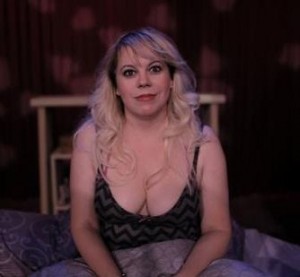 As performer and author, the temptation is to link Vangsness to the character she creates. One can’t help but wonder if another actor would have been able to convey as many emotional ambiguities in the part. But there’s no doubt about it: Her turn as a self-absorbed, trivial creature who is obsessed with sex at the cost of emotional depth—while still sentimentally believing she’s searching for love—is on the nose.
As performer and author, the temptation is to link Vangsness to the character she creates. One can’t help but wonder if another actor would have been able to convey as many emotional ambiguities in the part. But there’s no doubt about it: Her turn as a self-absorbed, trivial creature who is obsessed with sex at the cost of emotional depth—while still sentimentally believing she’s searching for love—is on the nose.
photos by Darrett Sanders
Potential Space
Theatre of Note in Hollywood
scheduled to end on October 27, 2012
for tickets call 323-856-8611 or visit http://www.theatreofnote.com
